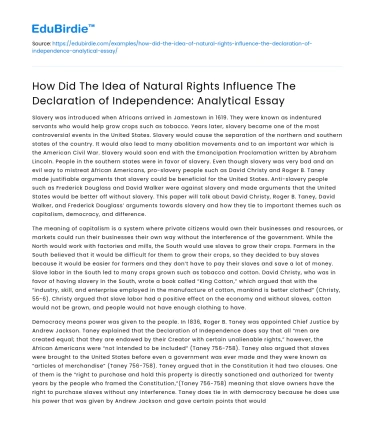Slavery was introduced when Africans arrived in Jamestown in 1619. They were known as indentured servants who would help grow crops such as tobacco. Years later, slavery became one of the most controversial events in the United States. Slavery would cause the separation of the northern and southern states of the country. It would also lead to many abolition movements and to an important war which is the American Civil War. Slavery would soon end with the Emancipation Proclamation written by Abraham Lincoln. People in the southern states were in favor of slavery. Even though slavery was very bad and an evil way to mistreat African Americans, pro-slavery people such as David Christy and Roger B. Taney made justifiable arguments that slavery could be beneficial for the United States. Anti-slavery people such as Frederick Douglass and David Walker were against slavery and made arguments that the United States would be better off without slavery. This paper will talk about David Christy, Roger B. Taney, David Walker, and Frederick Douglass’ arguments towards slavery and how they tie to important themes such as capitalism, democracy, and difference.
The meaning of capitalism is a system where private citizens would own their businesses and resources, or markets could run their businesses their own way without the interference of the government. While the North would work with factories and mills, the South would use slaves to grow their crops. Farmers in the South believed that it would be difficult for them to grow their crops, so they decided to buy slaves because it would be easier for farmers and they don’t have to pay their slaves and save a lot of money. Slave labor in the South led to many crops grown such as tobacco and cotton. David Christy, who was in favor of having slavery in the South, wrote a book called “King Cotton,” which argued that with the “industry, skill, and enterprise employed in the manufacture of cotton, mankind is better clothed” (Christy, 55-6). Christy argued that slave labor had a positive effect on the economy and without slaves, cotton would not be grown, and people would not have enough clothing to have.
Save your time!
We can take care of your essay
- Proper editing and formatting
- Free revision, title page, and bibliography
- Flexible prices and money-back guarantee
Democracy means power was given to the people. In 1836, Roger B. Taney was appointed Chief Justice by Andrew Jackson. Taney explained that the Declaration of Independence does say that all “men are created equal; that they are endowed by their Creator with certain unalienable rights,” however, the African Americans were “not intended to be included” (Taney 756-758). Taney also argued that slaves were brought to the United States before even a government was ever made and they were known as “articles of merchandise” (Taney 756-758). Taney argued that in the Constitution it had two clauses. One of them is the “right to purchase and hold this property is directly sanctioned and authorized for twenty years by the people who framed the Constitution,”(Taney 756-758) meaning that slave owners have the right to purchase slaves without any interference. Taney does tie in with democracy because he does use his power that was given by Andrew Jackson and gave certain points that would support his argument when mentioning the Declaration of Independence and the Constitution.
David Walker was a free African American from Boston, Massachusetts. Walker wrote a pamphlet called the “Appeal” that would argue about the Declaration of Independence. In a frustrated manner, Walker would explain to Americans to read back one of the most important lines in the Declaration of Independence, which says “We hold these truths to be self-evident that all men are created equal, that they are endowed by their creator with certain unalienable rights; that among these are life, liberty, and the pursuit of happiness” (Walker), and claiming why Americans are mistreating African Americans instead of following the practice after the United States won their independence. Walker mentions that slave owners do not want their slaves to read the appeal because they’re afraid of being exposed to who they really are and don’t want to create conflict with their slaves. Walker used democracy in his argument because he created a pamphlet for slaves to read and it would motivate them to create abolition movements and to fight for their rights.
Frederick Douglass was an abolitionist in the United States who escaped slavery. Douglass would use differences when making an argument about why he did not decide to celebrate the Fourth of July. He explains that the United States before gaining independence was known as the thirteen colonies and was mistreated by the British government. Douglass says that he does show respect for the Founding Fathers who risked “their lives, their fortunes, and their sacred honor on the cause of their country,” (Douglass) but when it comes to liberty, they “lost sight of all interests” (Douglass). Douglass also states that celebrating the Fourth of July would not be a good idea for slaves because it celebrates the freedom of the United States from Great Britain, but it does not give freedom to slaves because of the mistreatment of the Americans towards them.
I’ve explained two pro-slavery and anti-slavery readings by David Christy, Roger B. Taney, David Walker, and Frederick Douglass and how these readings would tie to democracy, difference, and capitalism. Even though the pro-slavery readings sounded very absurd and it was in favor of slavery, they explained justifiable reasons why slavery was a good resource in the South. Anti-slavery also gave good reasons why slavery should no longer be needed in the United States and why it was so harsh.






 Stuck on your essay?
Stuck on your essay?

